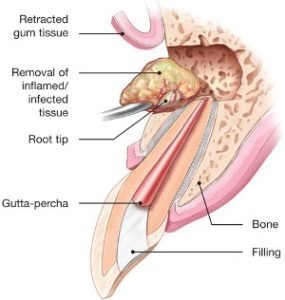If root canal therapy fails to fully heal one of your teeth, we can suggest follow-up procedures to increase your odds of a successful recovery. In addition to endodontic retreatment, endodontic surgeries may be able to help save your tooth. For example, your initial treatment could have failed due to a tiny crack not seen when taking X-rays and other images. An endodontic surgery could allow us to open tissue and locate the problem area that requires removal.
Because you rely on your teeth to last an entire lifetime, we will take every step available to help preserve your tooth. Endodontic surgery includes multiple procedures to address the variety of problems associated with receiving root canal treatment. By becoming informed about your surgical options for correcting your tooth’s structure, you will know what to expect.
Apicoectomy
An apicoectomy is the most common endodontic surgery we perform to save failed root canal-treated teeth. Also known as a root-end resection, it may be needed if you experience infection or inflammation on or near the bony area near your tooth’s roots. We begin by applying anesthesia to the affected area and opening your gum tissue near the tooth to see the underlying bone. We then remove all inflamed or infected tissue to allow your tooth to heal. An apicoectomy also removes the very end of the root and places a small filling to seal the end of your canal. Many patients typically return to normal activities within a day and report generally mild post-surgical discomfort.

Removing Calcium Deposits
Endodontic surgery becomes necessary when the presence of calcium deposits prevents us from effectively using our instruments to perform a root canal procedure. The goal of this surgical intervention is to remove the calcium deposits, allowing for the completion of your endodontic treatment. This involves thoroughly cleaning the affected area and then sealing your canal, leading to the preservation of the tooth.
Examining Your Tooth’s Roots
If you experience consistent oral pain whose cause we fail to detect through radiography, we will suggest endodontic surgery to continue your diagnosis. There is a possibility that a fracture inside the tooth or canal is not apparent on your X-rays. By creating a small incision near the tooth’s roots, we will attempt to find your problem and offer treatment.
Talk To Your Londonderry, NH Dentist About Saving Your Tooth With Endodontic Surgery
While finding out you need a surgical process may not be ideal, endodontic surgery is sometimes necessary to save your tooth. Fortunately, advancements in endodontic techniques can increase your comfort during treatment and quicken your recovery time. To learn more about our endodontic services, call our Londonderry, NH office today at 603-965-3407.



